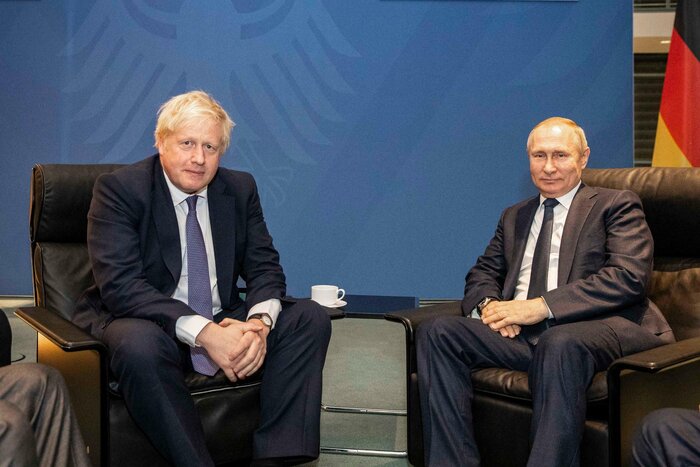Refusal to extend the visa of a BBC journalist has been condemned by the British government and the BBC as an attack to the freedom of media. Of course, the Russian Foreign Ministry’s refusal to extend the visa of this British journalist was in reciprocity to the non-extension of the visa of Russian journalists by Britain even though British officials believe that Russian journalists are free to work in Britain. In June, another incidence caused a new tension in the crisis-hit relations of the two sides. In this incidence, one of Russia’s fighter jets fired shots at a British warship in the region near Crimea. Britain does not recognize Russia’s annexation of Crimea and consider Crimea as part of the Ukrainian soil even though Russia insists the areas surrounding Crimea are Russia’s territorial waters. It could be gullible to restrict crisis-hit relations between London and Moscow to the recent tensions. Therefore, the main between Russia and UK are presented below.
Spots of difference between Moscow and London
Relations of Russian with the United Kingdom in general has reached its lowest possible level since the termination of the cold war and the annexation of Crimea to Russia as well as the allegation of Kremlin’s interference in elections in Western countries, the hacking of websites of various institutes and other measures such as the hybrid war. Especially after the poising of Sergei Skripal, the former Russian spy, and his daughter Yulia with the nerd gas in 2018, such relations exacerbated. Of course the problem between London and Moscow emanates from their different approach to the international system and the approach of Russian leaders to the status of Britain in the international system: from the viewpoint of Kremlin, Britain does not carry the same wight and rank as Russia’s. In Kremlin’s view, Russia has been always a big power and is somehow considered the center of the multipolar and multifaceted world while Britain does not belong to this oligarchy. From the viewpoint of Russia, Britain does not enjoy necessary capabilities to advance a real independent foreign policy. Given that London does not possess geopolitical independence, Britain is placed in the second level of global powers and is a small island which is ignored by many countries.
Russia believes that incidents of the past two decades well indicate that Britain has adopted a hostile approach towards Russia: for example, giving asylum to Boris Berezovsky, the famed Russian oligarch by Britain in 2003, British allegation to Russia over the murder of Alexander Litvinenko in 2006, UK’s absolute support for EU sanctions on Russia in 2014 and British efforts to incite international reaction about Sergei and Yulia Skripal in 2008. Of course, events such as the war on Iraq in 2003 and or color revolutions in former Soviet Union republics in 2003 and 2005 are attributed to the US and the whole West including Britain. Russia’s approach to Britain could be divided into several parts. First, London does not occupy a special place in Russia’s thinking and Britain is exaggerating its role and the role of this country is not that big. Second, London is responsible for negative developments in the relations between the two sides; because Russia is constantly portrayed as enemy in British media. Third, Britain and the European-Atlantic society are spreading lies about Russia and are not reliable; this is clear in various issues such as color revolutions and or attack on Iraq. Fourth Britain has been adopting double standards in various issues.
Relations between the two especially in the past decade after the Ukraine crisis of 2014 have been inappropriate and remarkable critical and London and Moscow have faced differences on the most important international issues.
Russians hybrid war against Britain: Former British Prime Minister Theresa May pointed out on 13 November 2017 to Russians “destructive” measures against Britain in cyber space and hybrid war and said Russia the main threat to international system and Britain’s role is to defend a principle-based the global order against irresponsible governments that are seeking to destroy this order.
The Ukraine crisis and annexation of Crimea to Russia: In the national security strategy of Britain in 2015, and the strategic defense and security review, the issue of the re-emergence of state-centered threats is highlighted and Russia is introduced as an aggressive, nationalist and despotic state which has increasingly turned into an opposition to the West.
The murder of Russian citizens in Britain: Poisoning of Sergei Skripal, the former Russian spy, and his daughter Yulia with the nerd gas in Salisbury on 4 March 2018 has caused tension in bilateral relations. In January 2016, findings of investigations concerning the murder of Alexander Litvinenko in 2006 demonstrated that Moscow played a role in the murder of Skripal.
Future prospects
In the past one decade, Britain has adopted a more aggressive approach in its relations with Russia both in words and actions. This can be well spotted in London acts in 2014 and 2018. In the recent foreign policy document of the UK in March 2021, China and Russia have been considered as systematic rivals of London in the soft power era. The document reads Russia alongside Iran and North Korea are seeking to weaken international security and order and Russia is the most serious threat in the region. It could be mentioned that bilateral relations are in confrontation and there is no basis of cooperation and one cannot be hoping partnership between Moscow and London. It can be expected that in future tensions such as the Black Sea incidence or journalists’ visa issue would re-emerge.










0 Comments